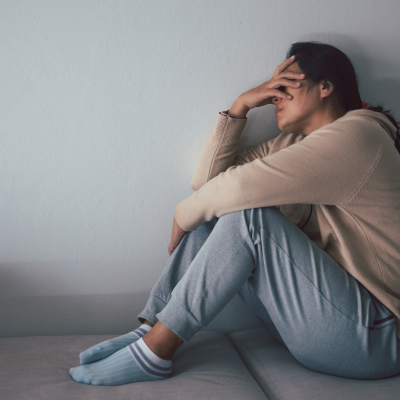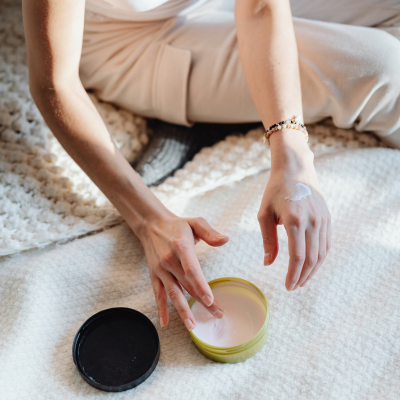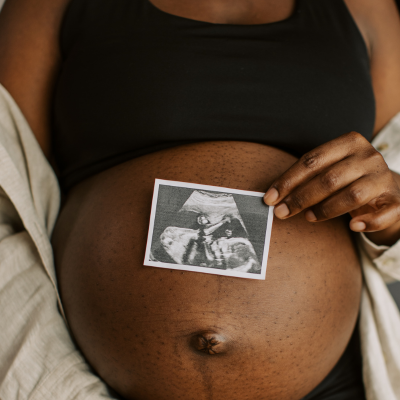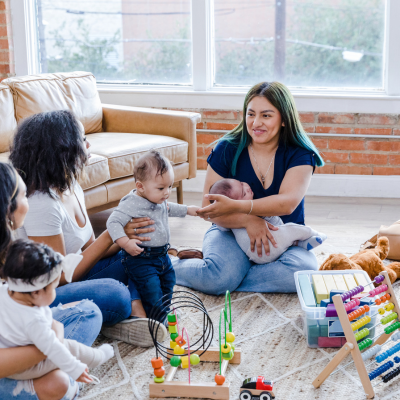If you’re a soon-to-be mom or already chin-deep in motherhood, there’s a good chance you have at least some understanding of postpartum depression. Postpartum depression is a common experience but, unfortunately, it’s not an easy one. It’s important to have a clear understanding of what postpartum depression actually is… and what some of the common risk factors are. In this post, I break it all down for you so that you can better understand this mental health struggle and it’s causes.
How Do We Define Postpartum Depression?
The thing to know about postpartum depression is that it’s similar to other depressive episodes. The difference is that it happens to a woman during pregnancy or during the first year after giving birth. The onset can be at ANY time during that window.
This is important to know for mothers who didn’t struggle in those first weeks or months but whose emotional state has since suffered. Symptoms of postpartum depression run the gamut from feeling weepy, hopeless and down to feeling trapped or experiencing long crying spells. Excessive overwhelm, anxiousness, feeling on-edge or frustrated are also symptoms of postpartum depression. Again, this is depression that shows up during this particular season of life.
Many people want to know what “causes” postpartum depression, however, we need to look at so many different variables to understand this. There are reasons that you might be more likely to develop PPD, but we can’t always draw a straight line to the particular factor that made the difference. So that said, focusing on “risk factors” can help us understand what’s at play.
Who Is At Risk?
Let’s dive into the most common factors for you to know:
1. Personal history of depression or anxiety.
Your mental health background plays a role in whether or not you’re likely to experience postpartum depression. If you suffered from anxiety and depression before your pregnancy, you’re at a higher risk for postpartum depression after. The same goes if you experienced depressive episodes after previous pregnancies.
2. Having a family history of depression or mental illness.
Take a look at your family tree. How many depression sufferers are in your family? Did your mother have a tough time with mental health after giving birth? Did either of your parents battle emotional lows? These all increase your risk.
3. Domestic violence or abuse in your relationship.
Having a baby is already one of the most difficult adjustments a person can make in their life. That means that even in the most stable of relationships, the mother can suffer during this period of immense change. If on top of that, there’s also physical and/or emotional abuse taking place, it’s very likely that depression can set in.
4. You don’t have enough support.
Think about what you know about family systems in the past where extended family members played a more active role in a child’s life. Mothers aren’t meant to go through early motherhood alone! In our hustle culture and perfectionist society, we think we’re supposed to just naturally be good at everything included in the mom role. We hesitate to ask for help! Many moms believe that asking for help is a sign of weakness or that caring for your baby should be easy, but this sets them up to feel like they’ve failed. You’re not just naturally supposed to know what to do all the time.
Women who have support fare better emotionally. So ask your mother, your sister or that best friend. If you don’t have support already built-in, can you hire someone to help? Are there any free community services that help moms in need?
5. Stressful life events.
Stress increases your chances of experiencing depression in general and postpartum depression is definitely included! Think about what has happened in your life recently. Have you or your partner lost employment? Are you stressed about the security of your income? Family members coming down with illnesses is a major stressor. Perhaps you’ve also recently relocated.
All of these are stressful life events are worth paying attention to when it comes to considering the state of your mental health post-baby.
6. Childbirth trauma.
It doesn’t matter how you gave birth or what others say about your experience: if it was incredibly upsetting, scary, or traumatic, you’re susceptible to postpartum depression. Even if nothing went “wrong” during labour, if it felt traumatic and you’re having a hard time processing it or feeling emotional, then yes, it was a traumatic experience. It’s so hard to heal from that difficult experience when you’re expected to just shift your focus and care for a newborn!
7. Perfectionism and high expectations.
A perfectionist mindset and anxiety are best friends. People who score high on perfectionism tests tend to battle anxiety and depression more often than those who score low. If you have incredibly high expectations for yourself in general, it’s useful to evaluate how you assume you’ll be as a mother. If you accept nothing less than nailing it all the time, you may have a hard reality check postpartum because a certain level of difficulty and challenge in motherhood is inevitable. This isn’t a reflection of you: it’s so hard to just give endlessly.
When you expect yourself to be perfect at something you’ve never done before, that can really take a toll on your mental wellbeing.
Just as it’s so important to know whether you’re at risk for postpartum depression, it’s also important to know that these seven risk factors don’t always predict that you’ll develop depression. If you recognized yourself in all of the above, this doesn’t mean there’s nothing you can do. Knowing what you now know about what causes postpartum depression, you can actually prepare by taking preventative measures.
So, if you notice that you’re lacking in your support system, maybe reach out (or even hire) help before your due date. If you know that you’re a perfectionist, re-jig those expectations now! If a recent event has you feeling anxious, see if there’s an action plan you can put in place to ease that stress.








Comments +